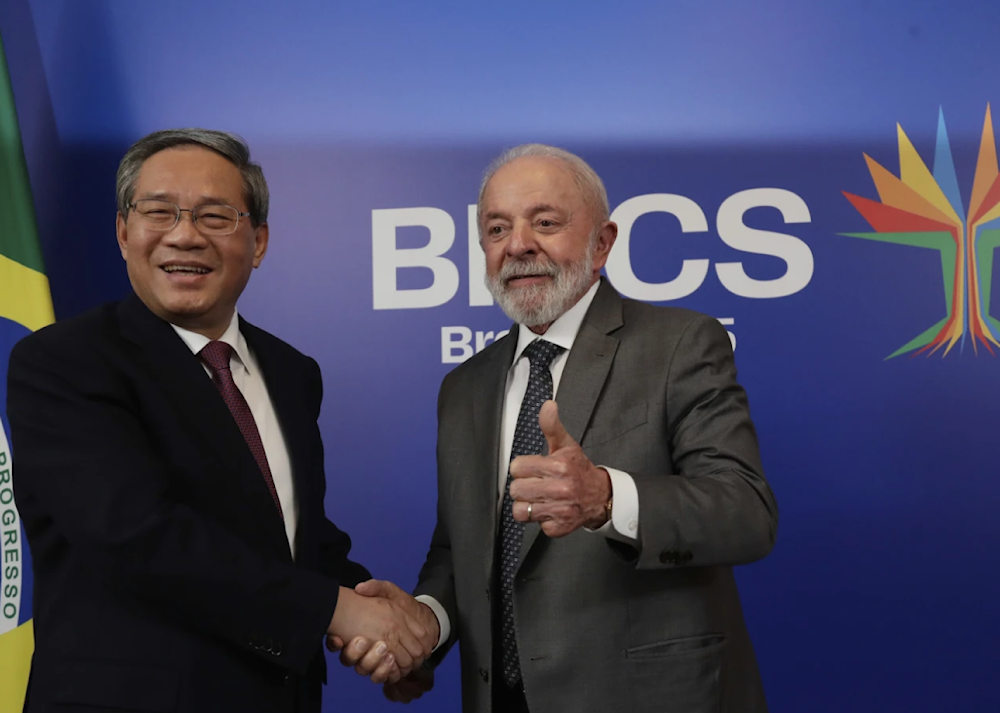BRICS summit kicks off in Rio with expanded membership, global goals
This year's summit is focused on enhancing the voice of the Global South in the international order.
-

Brazilian President Luiz Inacio Lula da Silva flashes a thumbs up as he and China's Premier Li Qiang pose for photos during their bilateral meeting ahead of the upcoming 17th annual BRICS summit in Rio de Janeiro, on July 5, 2025 (AP)
The 17th BRICS Summit has officially kicked off in Rio de Janeiro, bringing together leaders from the expanded 11-member bloc to discuss key global challenges and consider new membership applications from countries, including Türkiye and Azerbaijan.
Held under the theme “Strengthening Global South Cooperation for More Inclusive and Sustainable Governance,” the two-day summit runs from July 6–7 and marks the first high-level meeting of the newly expanded BRICS alliance. The event is being closely watched as the bloc aims to assert a greater role in reshaping global governance.
All 11 member states are represented: Brazil, Russia, India, China, and South Africa, along with new members Egypt, Ethiopia, Indonesia, Iran, Saudi Arabia, and the United Arab Emirates.
In addition to core participants, the summit has welcomed delegations from invited partner nations, including Belarus, Bolivia, Kazakhstan, Cuba, Malaysia, Nigeria, Thailand, Uganda, Uzbekistan, and Vietnam.
Hosted by Brazilian President Luiz Inácio Lula da Silva, high-level attendees at the summit include Indian Prime Minister Narendra Modi, South African President Cyril Ramaphosa, Chinese Premier Li Qiang, representing Chinese President Xi Jinping, and Iranian Foreign Minister Abbas Araghchi, representing Iranian President Masoud Pezeshkian. Russian Foreign Minister Sergey Lavrov is attending in person, representing President Vladimir Putin who is participating virtually.
Lula da Silva opens summit
In his opening remarks at the meeting in Rio de Janeiro, Brazilian President Luiz Inacio Lula da Silva drew a parallel with the Cold War's Non-Aligned Movement, a group of developing nations that resisted formally joining either side of a polarized global order.
"BRICS is the heir to the Non-Aligned Movement," Lula told leaders. "With multilateralism under attack, our autonomy is in check once again."
BRICS nations now represent more than half the world's population and 40% of its economic output, Lula noted in remarks on Saturday to business leaders, warning of rising protectionism.
"If international governance does not reflect the new multipolar reality of the 21st century, it is up to BRICS to help bring it up to date," Lula added in his opening remarks.
Furthermore, he defended the integrity of Iran's borders, following the Israeli war and the US bombing of Iranian nuclear facilities, highlighting the failure of US-led wars in the Middle East.
Putin calls era of liberal globalization 'obsolete'
He told counterparts that the influence of BRICS "continues to grow" and said the bloc had become a key player in global governance.
Speaking via video link to the summit in Rio de Janeiro, Russian President Vladimir Putin told BRICS leaders that the era of liberal globalization was obsolete and that the future belonged to swiftly growing emerging markets, which should enhance the use of their national currencies for trade.
"Everything indicates that the model of liberal globalization is becoming obsolete," Putin said in televised remarks, adding, "The center of business activity is shifting toward the emerging markets."
Putin also called on the BRICS countries to step up cooperation in a range of spheres, including natural resources, logistics, trade, and finance.
Enhancing Global South voice
The summit is focused on enhancing the voice of the Global South in the international order. Key topics include reforming global financial institutions like the International Monetary Fund (IMF), promoting sustainable development, advancing climate action, improving global public health, and regulating the risks of artificial intelligence.
One of the expected highlights is a joint declaration advocating for reform of the UN Security Council and a more equitable distribution of voting rights and quotas within the IMF. Other initiatives under discussion include the creation of a BRICS fund to protect tropical forests, expanding digital transformation efforts, and strengthening BRICS as a platform for alternative global cooperation.
The summit marks Indonesia’s first participation as a full BRICS member. Vietnam, recently named an official BRICS partner, has also sent a delegation to Rio.
This year’s gathering is Brazil’s fourth time hosting a BRICS summit, following earlier meetings in Brasília (2010, 2019) and Fortaleza (2014). Previous Brazilian-hosted summits saw landmark developments, including calls for global financial reform in 2010, the establishment of the BRICS Development Bank and Contingent Reserve Arrangement in 2014, and renewed multilateral trade commitments in 2019.
Now, in 2025, BRICS returns to Brazil at a defining moment, with expanded membership, rising geopolitical influence, and an ambitious agenda to reshape global governance from the perspective of the Global South.

 4 Min Read
4 Min Read









